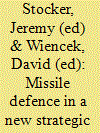| Srl | Item |
| 1 |
ID:
048228


|
|
|
|
|
| Publication |
Geneva, UNIDIR, 2003.
|
| Description |
xi, 142p.
|
| Series |
UNIDIR/2003/10
|
| Standard Number |
9290451491
|
|
|
|
|
|
|
|
|
|
|
|
Copies: C:1/I:0,R:0,Q:0
Circulation
| Accession# | Call# | Current Location | Status | Policy | Location |
| 047194 | 341.23/UNI 047194 | Main | On Shelf | General | |
|
|
|
|
| 2 |
ID:
048236


|
|
|
|
|
| Publication |
London, Royal United Services Institute for Defence and Security Studies, 2003.
|
| Description |
71p.
|
| Contents |
A selection of papers from a conference held at RUSI, 18-19 November 2002
|
| Standard Number |
0855161817
|
|
|
|
|
|
|
|
|
|
|
|
Copies: C:1/I:0,R:0,Q:0
Circulation
| Accession# | Call# | Current Location | Status | Policy | Location |
| 047198 | 358.174/STO 047198 | Main | On Shelf | General | |
|
|
|
|
| 3 |
ID:
098784


|
|
|
|
|
| Publication |
2010.
|
| Summary/Abstract |
A significant and growing body of literature related to security regimes focuses on the importance of either common knowledge or common norms to the success of efforts to limit military competition. This paper challenges this central pillar of the arms control literature. Security regimes, in particular arms control regimes, are not necessarily the product of common knowledge, norms, or shared identities. Rather, actors can and sometimes do cooperate because they do not fully understand one another and lack information. In these cases, examples of what I will refer to as "imagined intersubjectivity"-the mistaken belief that two actors share information, norms, and identities when in fact each has an idiosyncratic understanding-the lack of information is crucial for international cooperation. I analyze the record of the Anti-Ballistic Missile (ABM) Treaty negotiations. Through process-tracing, I will argue that three crucial moments in the negotiation process were premised on a misunderstanding of the position of the other party. The implications for cooperation without intersubjectivity are then explored.
|
|
|
|
|
|
|
|
|
|
|
|
|
|
|
|